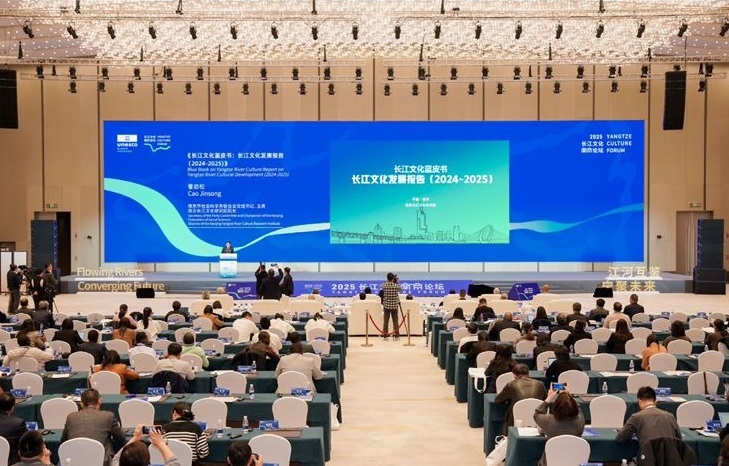By Mahnoor Makhdoom
NANJING: The 2025 Yangtze Culture Forum opened today at the Yangtze International Conference Center in Nanjing, drawing scholars, government officials, and international representatives to discuss the cultural, ecological, and economic significance of China’s longest river. Co-hosted by UNESCO and the Nanjing Municipal Government with strong support from Xinhua News Agency, the forum highlighted the Yangtze’s enduring role as a cradle of civilization and a model for sustainable development.
Acting Mayor Li Zhongjun reflected on the river’s historical and modern significance, noting that “Nanjing depends on the Yangtze, and the river shapes the city’s mountains, waters, and cultural heritage. We aim to integrate ecological protection, industrial innovation, and cultural inheritance, allowing the Yangtze to nourish both people and civilization.” He emphasized the city’s growth as an innovation hub and transportation nexus, linking inland China to global markets while preserving the river’s ecological and cultural vitality. The forum also marked the release of the strategic report “A Path of Tranquil Waters, Strong Nation, Benefit to the People – Research on the New Era River Strategy”, jointly prepared by Xinhua’s National High-End Think Tank and the China Institute of Water Resources and Hydropower. The report outlines a vision for the Yangtze that combines ecological protection, cultural preservation, and sustainable development, reflecting China’s river governance strategy.
The report stresses that ecological protection has been elevated to a top priority in the Yangtze’s governance, and that China has forged a mature, systematic, and forward-looking governance approach. It argues that the philosophy behind this strategy of combining ecological conservation with green development, regional coordination, cultural heritage, and shared benefits – offers valuable lessons for global river management.
Beyond the report launch, the forum convenes several thematic panels. These include discussions on river culture protection, the role of digital technology in preserving long‑river heritage, and how river-based civilizations can contribute to international cultural exchange. Experts emphasize that the Yangtze is not merely a natural resource but a bedrock of Chinese civilization whose values can be adapted to modern sustainable development. One of the forum’s highlights is its international dimension. River cities from around the world are represented, bringing together diverse perspectives on water‑culture, ecological governance, and global river heritage.
UNESCO East Asia Regional Director, Professor Shahbaz Khan delivered a keynote, highlighting international cooperation and river ethics. “Rivers are living archives of civilization,” Khan said. “China’s initiatives in river protection demonstrate how culture, science, and policy can unite to maintain ecological balance and promote human well-being.” UNESCO Assistant Director-General, in a video address, connected the forum to the UN 2030 Sustainable Development Goals, noting that “the health of rivers reflects the harmony between humans and nature, and China’s actions provide a valuable example for the world.”
Xinhua News Agency President Fu Hua stressed the Yangtze’s central role in Chinese civilization, describing it as a flowing testament to centuries of culture and innovation. “The Yangtze has witnessed the rise of dynasties, the journeys of explorers, and the transmission of knowledge,” Fu said, noting that the forum provides an international platform to share China’s experiences in river governance and cultural promotion.
Vice Minister of Water Resources Liu Dongshun highlighted the strategic importance of rivers for national development. He talked about China’s efforts to balance environmental protection with economic growth, including the implementation of the Yangtze River Protection Law and the ten-year fishing ban, and emphasized the need for global collaboration to safeguard freshwater resources.
Throughout the forum, speakers and attendees explored how rivers shape human civilization, sustain urban life, and inspire cultural creativity. With discussions spanning policy, science, and heritage preservation, the 2025 Yangtze Culture Forum reaffirmed Nanjing’s role as a hub for cultural exchange and a showcase for how river management can advance both environmental sustainability and civilizational dialogue.





